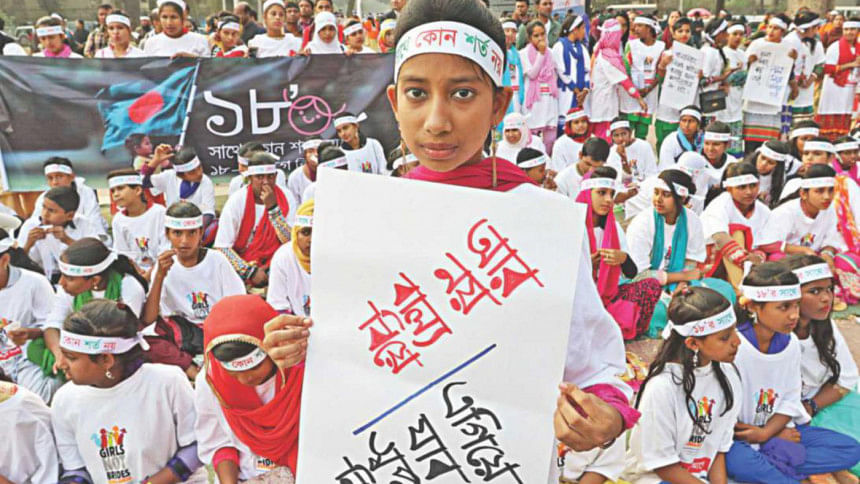Let girls realise their dreams

All over the world, we are seeing more and more girls raising their voice for their rights. From stopping child marriages to standing up against gender-based violence and demanding action to address the climate emergency—girls are refusing to be ignored. From my work in South Asia and West Africa, I have been profoundly inspired by girls who are determined to claim their rights and create a better future for themselves and their communities—from walking for hours to reach schools each day to forming groups in their communities to raise awareness on children's rights.
And real progress has been made. More girls are attending and completing school than ever before. Fewer girls are getting married or becoming mothers while still children themselves, and more are gaining the skills they need to be employed and excel in work.
But there is still a long way to go. Each year, 12 million girls are married before they turn 18 years of age. Based on current progress, the world will miss the deadline to achieve Sustainable Development Goal (SDG) target 5.3 to end child marriage by 2030. The girls who will be married are more likely to be poor and living in countries affected by conflict or humanitarian crises.
Child marriage is a serious violation of girls' rights. It is one the biggest reasons for girls dropping out of school and marks the end of their childhood. Married girls are exposed to gender-based violence and face the risks associated with early pregnancy and social isolation. Adolescent mothers are more vulnerable to suffering from birth related complications than adult women. Married girls are not usually able to participate in decision making of their families, and so patriarchal norms continue.
Poverty, lack of education, vocational skills or development opportunities for girls, natural disasters, and weak enforcement of law are some of the main contributors to child marriage. Moreover, in many societies women are not viewed as individuals with rights to realise their full potential. The lower status of girls and women in societies and the social acceptance of child marriage are two of the reasons why the practice continues in many places even when laws exist against it, and both must be addressed to help end child marriage.
Feminist thinker, writer, and social reformer Begum Rokeya (1880-1932) wrote the following in "Motichur" in 1904,"We shall do whatever is needed to be equal to men. If we have to earn independently in order to gain independence then we should do that … Why shouldn't we earn? Don't we have hands, legs, and intellect? Can't we engage in business with the amount of energy that we spend in household work in the husband's place? ...Why are we crying if the girls are not married off. Educate your daughters properly and let them enter the workplace; they can earn their own livelihood."
Begum Rokeya challenged the societal norms regarding the role of girls and women in society through her writing and pioneered girls' education by establishing a school for girls. One hundred years later, her observations are still relevant.
As the world prepares to commemorate the 30th anniversary of the United Nations Convention on the Rights of the Child, and after 24 years of Beijing Declaration and Platform for Action on advancing women's rights, action on preventing and responding to child marriage needs to be stepped up. Governments should invest in integrated strategies that address its root causes, and be held accountable for making progress. This will involve strengthening the economic resilience of families, increasing access for adolescent girls to education and sexual and reproductive health services, and supporting child protection systems where communities themselves protect girls from child marriage.
We must help parents and communities understand the rights that girls have to education, healthcare and protection, and to treat boys and girls equally. Men and boys should be involved in creating a society based on gender equality.
And we all must listen to girls about the decisions affecting their lives. Communities, governments and international agencies must guarantee space and support for girls' leadership and participation in local, national and international accountability and agenda-setting processes and their follow up.
During a mass gathering in Dhaka, adolescent girls protested against the special circumstances provision (that would allow marriage below 18 years) of Child Marriage Restraint Act 2017, along with child and human rights activists. I still vividly remember a placard that the girls had brought—"No to child marriage; we want to be equal citizens". Girls in all regions of the world are demanding equality. They have beautiful aspirations and are capable to contribute to society in a meaningful way. It is our responsibility to ensure that they grow up in a safe environment where they have opportunities to be educated, and realise their dreams. Parents, communities, governments and the international community—all will have to play their parts in this journey. Are we doing enough?
Laila Khondkar is Head of Advocacy and Policy—Child Protection, Save the Children International.

 For all latest news, follow The Daily Star's Google News channel.
For all latest news, follow The Daily Star's Google News channel. 



Comments